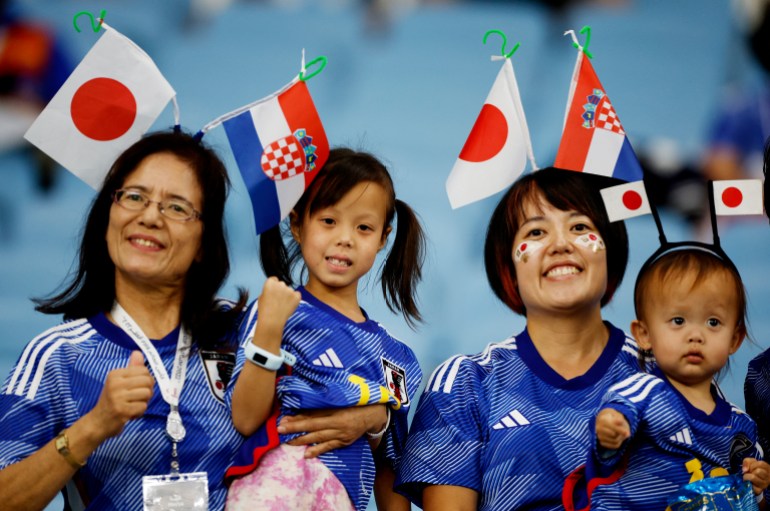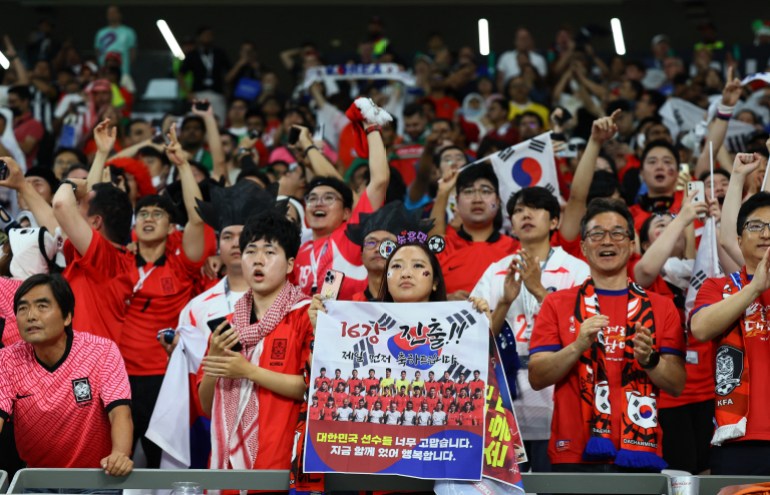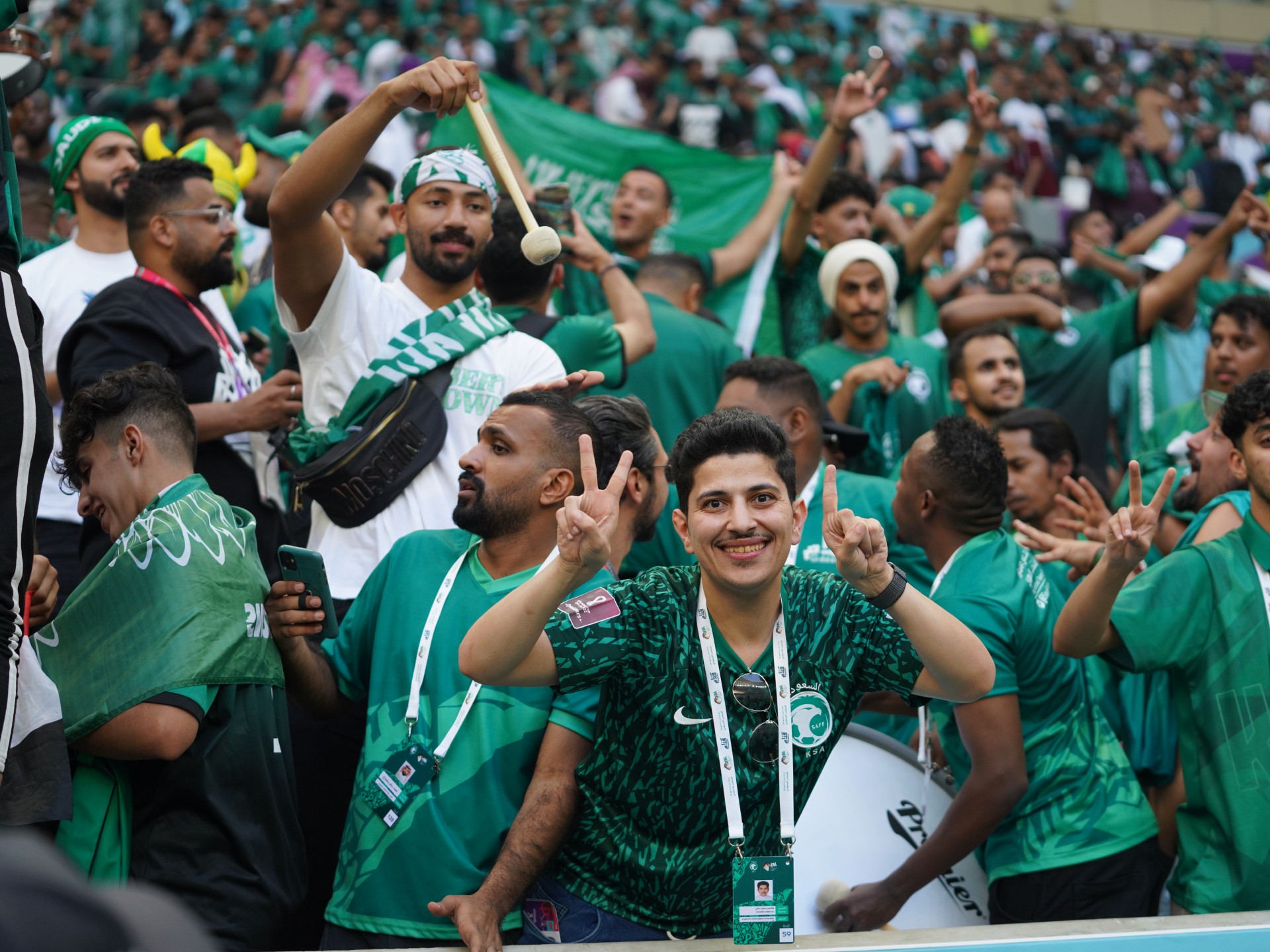The global nature of football has always been the heart of its popularity.
Football is played and understood in pretty much every country, and nothing captures its universal appeal like the international following that the World Cup draws every four years.
Yet something deeper appears to be afoot at the Qatar World Cup: The epicentre of a sport that has been dominated through its modern history by teams from Europe and South America may be shifting a bit to the east.
This is the first time that four teams from Asia and Africa qualified for the knockout stages of the competition – five if one includes Australia, which is part of the Asian Football Confederation.
Teams from the two continents have upset each of the world’s four top-ranked teams: Cameroon (ranked 43rd in the world) beat top-ranked Brazil, Morocco (22nd) defeated second-ranked Belgium, Saudi Arabia (51st) stunned Argentina, and Tunisia (30th) shocked France.
As if that wasn’t enough, Japan (24th) upset Germany (11th) and South Korea (28th) defeated Portugal (ninth).
On Tuesday, Morocco added to its scalps by beating Spain – ranked seventh – in the round of 16. And all of this at the World Cup hosted in the Middle East.
So what’s behind this spate of giant slayings?

European exposure
These up-and-coming countries have been working on strengthening their footballing structures, and the national teams have players on some of the most competitive teams in Europe, which brings them valuable exposure.
Whether it is Japan’s Takehiro Tomiyasu (Arsenal), South Korea’s Son Heung-min (Tottenham Hotspur) or Moroccan hero Achraf Hakimi (Paris Saint-Germain), these players have competed against the best, making them fearless on the global stage, according to analysts.
“One of Japan’s biggest problems historically, as a national team, is that they’ve often played with too much respect for higher-ranked opponents and it cost them winnable results on big stages,” said Dan Orlowitz, a sports writer at the Japan Times. “The biggest thing the team gains from having so many players in Europe is that they are facing world-class opposition every week.”
Unlike Japan’s squad in the 1998 World Cup, the team that played in Qatar has players who start in the big European leagues and play in UEFA’s top competitions, Orlowitz said. “You don’t have to be scared of Germany and Spain if you’re used to playing them in different uniforms,” he said, “and that fearlessness is a big factor behind Japan’s wins.”

That’s also true for Arab and African nations.
Morocco’s squad has the most overseas-born players of any side in the World Cup, and while not many play in the big European clubs, the country’s dual citizenship rules allow it to tap the best talent on offer from the diaspora.
Grassroots to clubs
Orlowitz is convinced that Japan’s performances before the loss to Croatia are also a reflection of the growth of the game at the grassroots level – in particular, the establishment of youth academies “that are capable of producing world-class talent on a regular basis”.
One of the initiatives that Orlowitz cites as particularly critical is “Project DNA”, established by the J.League “to codify best practices and develop coaches and staff who can support these academies”, he said.
The World Cup has also helped shine a light on success stories from Saudi Arabia’s club structure: Most of the players who stunned Argentina 2-1 early in the tournament play for Al Hilal. The Saudi club reached the semi-finals of the Club World Cup in February before losing to Chelsea. Portuguese superstar Cristiano Ronaldo has been linked to a possible transfer to Al Nassr, also one of Saudi Arabia’s most successful clubs.
South Korea, which like Japan reached the round of 16, might have benefited also from their domestic competition, the K League, finishing early this year, allowing a short training camp for the national team. Most European leagues have overlapped with the World Cup this year.

Global game, global fans
At the same time, this World Cup has also pivoted towards fans in the east.
“The feasibility in terms of distance and pricing for Asian countries” has helped bring unprecedented numbers of fans from the continent to Qatar, said Chelston Pinto, conditioning coach as well as a player for Indian football club Bengaluru United. He has come to Qatar to attend the World Cup as a fan.
“World Cups are an experience like no other and I’m sure fans in Asia did not want to miss out on this one,” Pinto said.
Hayya Card holders who have match tickets do not need a visa to enter Qatar. Flights are cheaper and the distance from other Asian countries is less. And most Asian and African countries are well-connected to the Middle East.
At the 2018 World Cup in Russia, there were more Chinese than English ticket holders, even though China had not qualified and England were among the favourites. In the current World Cup, Saudi Arabians and Indians submitted the most requests for entry permits into Qatar for the tournament.
All of this coincides with the growing attention major European clubs are showering on Asian markets. After all, fans from countries that aren’t represented in the competition have been supporting sides like Argentina, Brazil, England, and Germany, following footballers they watch year-round playing for popular European clubs.
Earlier this year, Manchester United toured Thailand and Australia, while Liverpool played against Crystal Palace in Singapore. Tottenham Hotspur travelled to South Korea – home of their talisman striker Son Heung-min.
The traditional footballing elite in Europe appear to recognise that the sport’s future is shifting east. The success of Asian and African teams at the Qatar World Cup, and the passion of their fans, will likely only speed up that process.
